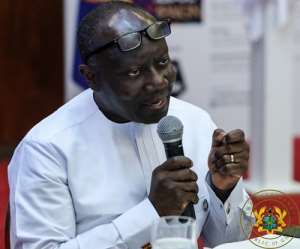
The energy sector, whose inherent financial and technical inefficiencies affect every facet of the economy and millions of lives, is next in line for a major clean-up after a similar exercise undertaken in the banking sector over the last two years, the Finance Minister, Ken Ofori-Atta, has said.
Fresh from an expensive banking sector clean-up that cost the taxpayer some GH¢12.1billion, renegotiation of take-or-pay energy contracts and streamlining excess capacity for power production and excess gas supply, is expected to save government close to GH¢3billion annually.
The Energy Commission estimates that there is currently about 2,300MW of excess installed capacity for power generation and 400MSCF of expensive excess gas supplied annually.
This means payment for unused power and gas constitute a major drain on the revenue envelope, and results in an elevated end-user tariff for industries and individual homes. This increases the cost of production for industry and the cost of living for households.
“There is no doubt that the situation in the energy sector is shocking the economy. We are in a state of emergency and must therefore respond with urgency and boldness. We shall from August 1st 2019, with the support of Parliament, make Take-or-pay contracts a beast of the past,” Mr. Ofori-Atta told Parliament when he presented the Mid-Year Fiscal Policy Review of the 2019 Budget Statement and Economic Policy & Supplementary Estimates of the government of Ghana.
He noted that: “Currently, according to the Energy Commission, our installed capacity of 5,083MW is almost double our peak demand of around 2,700MW. Notably, 2,300MW of the installed capacity has been contracted on a take-or-pay basis.
“This means that we are contractually obliged to throw away money for this excess capacity that we do not consume. This has resulted in us paying over half a billion U.S. dollars, or over GH¢2.5billion, annually for power generation capacity that we do not need.”
On the side of gas as a commodity, the country has contracted about 750 mmscf per day by 2023. This is after government terminated two other LNG contracts in 2017.
“Current demand is around 250 mmscf per day, and this is projected to rise to between 450 and 550 mmscf per day by 2023. About 640 mmscf of the contracted gas supply is on a take-or-pay basis, meaning we have to pay whether we use it or not.
“From 2020, if nothing is done, we will be facing annual excess gas capacity charges of between US$550 and US$850million every year. Thankfully, we have a plan to deal with this,” Ofori-Atta said.
Presently, for Sankofa Offshore Cape Three Points gas alone, government pays over US$51million per month under a take-or-pay contract for 154 mmscf per day – even though only 60 mmscf per day on average is taken for power production.
---B&FT




 We’ll no longer tolerate your empty, unwarranted attacks – TUC blasts Prof Adei
We’ll no longer tolerate your empty, unwarranted attacks – TUC blasts Prof Adei
 Bawumia donates GHc200,000 to support Madina fire victims
Bawumia donates GHc200,000 to support Madina fire victims
 IMF to disburse US$360million third tranche to Ghana without creditors MoU
IMF to disburse US$360million third tranche to Ghana without creditors MoU
 Truck owner share insights into train collision incident
Truck owner share insights into train collision incident
 Paramount chief of Bassare Traditional Area passes on
Paramount chief of Bassare Traditional Area passes on
 Two teachers in court over alleged illegal possession of BECE papers
Two teachers in court over alleged illegal possession of BECE papers
 Sunyani: Victim allegedly shot by traditional warriors appeals for justice
Sunyani: Victim allegedly shot by traditional warriors appeals for justice
 Mahama vows to scrap teacher licensure exams, review Free SHS policy
Mahama vows to scrap teacher licensure exams, review Free SHS policy
 Government will replace burnt Madina shops with a new three-story, 120-store fac...
Government will replace burnt Madina shops with a new three-story, 120-store fac...
